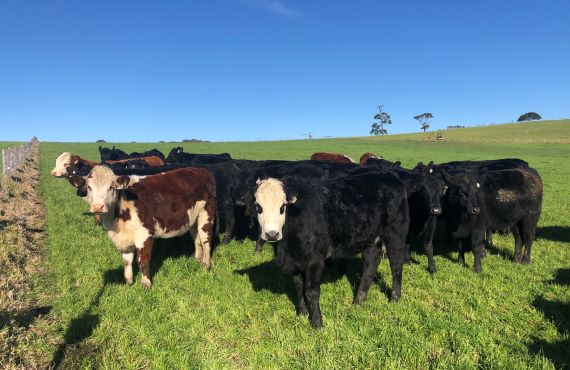
CCC virtual forum focuses on fertiliser stewardship on the south coast
30 July 2021

Cattle grazing on a Clean Coastal Catchments water quality monitoring site at Tilba Tilba Lake.
The first meeting of the Clean Coastal Catchments Livestock Fertiliser Stewardship Group (FSG) has highlighted key issues for sustainable livestock production on the south coast, particularly in the dairy and beef sectors.
Agronomists, consultants, and livestock and fertiliser industry representatives took part in the inaugural event on 29 July 2021, including Neil Moss, Senior Consultant with Scibus Strategic Bovine Services.
“I was lucky enough to be able to attend the first Livestock FSG meeting,” said Mr Moss. “It provided a useful perspective on the role agriculture plays as a key component of the 'upstream' environment for our coastal catchments.”
The Livestock FSG has been established as a forum that brings together a network of government and industry professionals to identify fertiliser management challenges, and find practical solutions to deal with animal, soil and plant nutrients leaching into the landscape.
The initiative has been facilitated by Luke Jewell from the Department of Primary Industries’ Clean Coastal Catchments project.
“This forum is about sharing knowledge and research at a regional level around potential risks to water quality that are generated by agriculture,” explained Mr Jewell.
“By working with trusted local agronomists and industry advisors, we hope to extend the reach of our research findings to the livestock producers they service.”
Livestock consultant Neil Moss supports the FSG’s focus on best practice fertiliser management.
“The FSG emphasised the critical need for advisors and farmers to work together to ensure that nutrients applied to pastures and from other farm sources, are applied responsibly and based on good soil test data as well as pasture and crop growth targets,” said Mr Moss.
“If this is done, both production and environmental goals will be optimised, and they shouldn’t be seen as being mutually exclusive outcomes.”
Guest speakers at the first Livestock FSG forum canvassed the Dairy Australia Fert$mart program as well as Fertilizer Australia's Fertcare technical standards for nutrient management planning on Australia dairy farms. Both the Fert$mart program and the Fertcare standards are designed to achieve optimal returns on-farm while minimising nutrient losses into the environment.
Agroecologist, Kirsty Yeates, also garnered strong interest with her presentation on regenerative agriculture, while Dr Zacc Larkin from the NSW Environment, Energy & Science (EES) Division, sparked lively discussion during an update on water quality data from the Tilba Tilba Lake.
Clean Coastal Catchments, with assistance from the EES Estuaries & Catchments Science team, has established a farm scale water quality monitoring site in the Tilba Tilba Lake region.
Data from the Tilba Tilba site is building on previous Marine Estate Management Strategy funded research looking at how nutrients in livestock systems are transferred off-farm.
The Clean Coastal Catchments project is working with agricultural industries in key coastal areas to actively manage issues associated with production and land management that could affect water quality in the marine estate.
The Clean Coastal Catchments team, in partnership with the NSW Local Land Services agency, aims to work closely with meat and dairy livestock industries to promote best practice production techniques.
Better management of fertiliser, animal waste and water on farm will assist industry to be more productive, profitable, and environmentally sustainable, while reducing negative impacts on coastal creeks and rivers and on the communities and businesses that rely on these waterways downstream.
Planning is underway for the next Livestock FSG event to take place in November 2021, in conjunction with a live gathering on the south coast, covid risk permitting.
The Clean Coastal Catchments project is funded by the NSW Government through the Water Quality Initiative of the Marine Estate Management Strategy. The ten-year Strategy was developed by the NSW Marine Estate Management Authority to coordinate the management of the marine estate.

